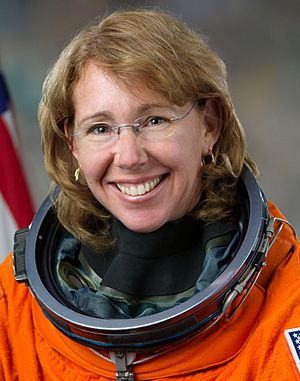Sandra Magnus facts for kids
Quick facts for kids
Sandra Magnus
|
|
|---|---|

Magnus in 2011
|
|
| Born | October 30, 1964 Belleville, Illinois, U.S.
|
| Space career | |
| NASA astronaut | |
|
Time in space
|
157d 8h 42m |
| Selection | NASA Group 16 (1996) |
| Missions | STS-112 STS-126/119 (Expedition 18) STS-135 |
|
Mission insignia
|
|
| Scientific career | |
| Fields | Materials science |
| Thesis | An Investigation of the Relationship between the Thermochemistry and Emission Behavior of Thermionic Cathodes Based on the BaO-Sc₂O₃-WO₃ Ternary System (1996) |
| Doctoral advisor | Norman Hill |
| Signature | |
Sandra Hall Magnus is an American engineer and a former NASA astronaut. She was born on October 30, 1964. Sandra Magnus flew to space three times during her career.
Her missions included STS-112, a long stay on the International Space Station (ISS) as part of Expedition 18, and STS-135. She is also a licensed amateur radio operator. From 2012 to 2018, Magnus was the executive director of the American Institute of Aeronautics and Astronautics.
Contents
About Sandra Magnus
Early Life and Education
Sandra Magnus grew up in Belleville, Illinois. She studied physics and electrical engineering at the Missouri University of Science and Technology. Later, she earned a PhD in materials science and engineering from the Georgia Institute of Technology in 1996.
Her research focused on how certain materials behave when heated. This work was supported by NASA.
Engineering Work Before NASA
In the 1980s, Sandra Magnus worked as an engineer for McDonnell Douglas. She helped design stealth aircraft. These planes are made to be very hard for radar to detect.
She also worked on the engine system for the A-12 Avenger II aircraft. This project was later stopped in 1991.
Becoming a NASA Astronaut
Sandra Magnus was chosen to become an astronaut in 1996. She trained for two years, from January 1997 to May 1998. After her training, she worked in the Astronaut Office.
Her tasks included working with space agencies from Europe, Japan, and Brazil. In 1998, she worked in Russia to help develop and test equipment for space. In 2000, she was a CAPCOM for the International Space Station. This meant she was the main communicator with astronauts in space.
Her First Space Mission: STS-112
Sandra Magnus flew her first space mission, STS-112, in October 2002. She was a mission specialist on the Space Shuttle Atlantis. The main goal of this mission was to add a new part, called the S1 truss section, to the International Space Station.
Magnus used the space station's robotic arm during three spacewalks. These spacewalks were needed to install and activate the new truss. The mission lasted for about 10 days, 19 hours, and 58 minutes.
Survival Training for Astronauts
Astronauts must be ready for anything, even an emergency landing. From January 29 to 31, 2006, Sandra Magnus took part in special survival training. She trained with two other astronauts, Oleg Artemiev and Michael Barratt.
They practiced surviving in a wild forest near Moscow. This training prepared them in case their Soyuz spacecraft had to land in an unpopulated area. She successfully completed this challenging test.
NEEMO 11: An Undersea Adventure
From September 16 to 22, 2006, Magnus commanded the NEEMO 11 mission. This was an undersea expedition at the National Oceanic and Atmospheric Administration's Aquarius laboratory. It is located off the coast of Florida.
With other astronauts, she practiced "moonwalks" underwater. They tested different spacesuit setups to simulate lunar gravity. They also practiced communication, navigation, collecting rock samples, and using remote-controlled robots. This helped them prepare for future missions to the Moon.
Living on the Space Station: Expedition 18
Sandra Magnus served as a flight engineer on the International Space Station. This was part of Expedition 18. She traveled to the station as a mission specialist on STS-126, which launched on November 14, 2008.
She lived and worked on the ISS for many months. She returned to Earth on March 28, 2009, as a mission specialist on STS-119. In total, she spent 133 days orbiting Earth during this mission.
Final Space Shuttle Mission: STS-135
On September 14, 2010, NASA announced that Magnus would be part of the STS-135 crew. This mission was originally planned as a rescue flight for STS-134, which was supposed to be the last Space Shuttle flight.
However, STS-134 went smoothly in May 2011, so no rescue was needed. Instead, STS-135 became the very last Space Shuttle mission. It launched successfully on July 8, 2011, and landed on July 21. In September 2012, Magnus became the deputy Chief of the Astronaut Office.
After Her NASA Career
In October 2012, Sandra Magnus left the NASA Astronaut Corps. She became the executive director of the American Institute of Aeronautics and Astronautics (AIAA). She held this important role until January 2018.
From 2018 to 2019, Magnus worked as a principal at AstroPlanetView. In 2019, she became the deputy director for Engineering in the Office of the Under Secretary of Defense for Research and Engineering.
On February 9, 2021, Virgin Galactic announced that Magnus joined their Space Advisory Board. This board helps guide the company as it works to make space travel more accessible. She joined other experts, including former astronaut Chris Hadfield.
See also
 In Spanish: Sandra Magnus para niños
In Spanish: Sandra Magnus para niños
 | Anna J. Cooper |
 | Mary McLeod Bethune |
 | Lillie Mae Bradford |

